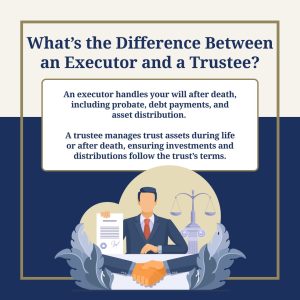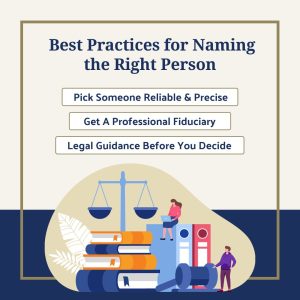Choosing the right executor or trustee is one of the most important (and often overlooked) decisions in estate planning. These individuals are responsible for carrying out your wishes, managing your assets, and guiding your loved ones through the legal and financial process after you’re gone. It’s a big responsibility, and the wrong choice can lead to delays, conflicts, or even legal disputes. In this article, we’ll walk you through common mistakes people make when naming an executor or trustee, and how to avoid them so your estate is handled with care, clarity, and confidence.
 What’s the Difference Between an Executor and a Trustee?
What’s the Difference Between an Executor and a Trustee?
While the roles of executor and trustee are often confused, they serve distinct purposes in your estate plan. An executor (also called a personal representative in Florida) is responsible for carrying out the instructions in your will after you pass away, including handling probate, paying debts, and distributing assets.
A trustee, on the other hand, manages any assets held in a trust, either during your lifetime or after your death, depending on how the trust is set up. Trustees have ongoing responsibilities, like managing investments, distributing funds to beneficiaries, and following the specific terms of the trust document.
Why Your Choice of Executor or Trustee Matters
The person you name as executor or trustee plays a key role in protecting your legacy. These individuals are entrusted with managing your estate, respecting your wishes, and making potentially complex financial or legal decisions. If they’re unprepared or unqualified, things can quickly go sideways, causing delays, family conflict, or even lawsuits.
Beyond competence, emotional readiness and interpersonal skills matter, too. The right person will act in good faith, communicate clearly with beneficiaries, and handle the stress of the role with calm and integrity. Taking the time to choose carefully and revisiting that choice when needed can spare your loved ones a lot of unnecessary hardship.
Common Mistakes to Avoid When Naming an Executor or Trustee
It’s easy to assume that choosing a trusted family member is enough, but being an executor or trustee requires more than just good intentions. Poor choices or overlooked details can create unnecessary complications during an already emotional time. Here are some of the most common mistakes people make when naming a fiduciary and how you can avoid them.
Choosing Based Solely on Family Relationships
Many people feel obligated to name a spouse, child, or sibling, even if that person isn’t the best fit. While it’s natural to want to keep things “in the family,” it’s important to choose someone who’s truly capable of handling the responsibilities. Loyalty and love are valuable, but they shouldn’t replace good judgment, organization, or decision-making skills.
Naming Someone Who Lacks Financial or Legal Knowledge
An executor or trustee doesn’t need to be a legal expert, but they should have a basic understanding of how to manage money and follow rules. If the person you’re considering lacks experience with finances, contracts, or paperwork, they might struggle to perform their duties or become overly dependent on professionals, resulting in unnecessary fees.
Appointing Co-Executors or Co-Trustees Without Clear Roles
It may seem fair to name two people to share the responsibility, but this can lead to confusion or disagreement if their roles aren’t clearly defined. Co-fiduciaries must make decisions together, which can cause delays if they don’t see eye-to-eye. If you must name co-executors or co-trustees, make sure they communicate well and have a solid working relationship.
Failing to Name an Alternate or Successor
Life is unpredictable. Your first choice may be unable or unwilling to serve when the time comes. Failing to name a backup could leave your estate in limbo, requiring the court to appoint someone. Always include at least one alternate executor or trustee in your documents to ensure a smooth transition if your primary choice can’t serve.
Overlooking Geographic or Logistical Issues
Your executor or trustee doesn’t have to live in Florida, but distance can create complications. Managing an estate from out of state may require travel, additional paperwork, or delay. In some cases, like managing property or attending court hearings, being nearby is a real advantage. Consider the practical realities of the role when making your decision.
Not Discussing the Role Ahead of Time
Surprising someone with this responsibility after your death isn’t ideal. Always talk to your chosen executor or trustee in advance to make sure they understand what’s involved and are willing to accept the role. This not only helps them prepare, but it also gives you peace of mind knowing they’re ready and on board with your plan.
Best Practices for Naming the Right Person
Choosing the right executor or trustee can make all the difference in how smoothly your estate is handled. While there’s no one-size-fits-all answer, there are a few guiding principles that can help you make a confident, informed choice. Whether you’re naming a loved one or considering a professional, these best practices will help you avoid issues and protect your legacy.
Choose Someone Who Is Responsible and Detail-Oriented
Administering a will or trust involves deadlines, paperwork, and sometimes difficult decisions. You’ll want someone who’s organized, communicative, and able to follow instructions carefully. If someone in your life already manages responsibilities carefully, they could be a good candidate for this role.
Consider a Professional Fiduciary or Corporate Trustee
In some cases, the best option is a neutral third party. Banks, trust companies, and licensed fiduciaries can manage estates objectively and professionally, especially when family dynamics are complicated or assets are complex. While this comes with a fee, the peace of mind and reduced risk of conflict can make it well worth the cost.
Match the Complexity of Your Estate to the Skills of the Fiduciary
If your estate includes business interests, investment accounts, multiple properties, or unique instructions, make sure your executor or trustee is up to the task. A simple estate may only require someone responsible and level-headed, while a complex estate may demand a professional or someone with financial experience. Choose someone whose skills match your estate’s needs.
Get Legal Guidance Before Finalizing Your Decision
Even if you feel confident in your choice, consulting an estate planning attorney can offer a valuable perspective. An attorney can walk you through each role’s responsibilities, flag potential issues, and help you structure your documents in a way that minimizes future conflict. The right legal guidance ensures your decision is legally sound and that your estate plan works as intended.
Legal Requirements for Executors and Trustees in Florida
While choosing someone you trust is essential, they also need to meet Florida’s legal requirements to serve. State law outlines specific eligibility criteria for executors (also called personal representatives) and trustees. If your chosen person doesn’t qualify, a court could reject your appointment, causing unnecessary delays and requiring a replacement. Here’s what you need to know before naming a trustee or executor.
Age, Residency, and Mental Capacity Requirements
To serve as an executor or trustee in Florida, a person must be at least 18 years old, mentally competent, and capable of fulfilling the duties required. Mental capacity is essential, as they must understand their role, make sound decisions, and manage your estate or trust responsibly. For executors, Florida gives preference to residents, but certain non-residents may still qualify under specific conditions.
Disqualifying Factors
Florida law prohibits individuals with felony convictions from serving as personal representatives. The court may also disqualify anyone who is mentally or physically unable to perform the duties, has a history of dishonesty, or poses a conflict of interest. The rules for trustees are a bit more flexible, but trustworthiness and the ability to carry out fiduciary responsibilities remain critical.
Florida-Specific Rules for Personal Representatives
Florida allows both residents and certain out-of-state relatives to serve as executors, but there are limits. If you name someone who lives outside of Florida and isn’t related by blood, adoption, or marriage, the court may reject the appointment. Florida also requires personal representatives to be U.S. citizens or permanent residents. These rules don’t apply as strictly to trustees, offering a bit more flexibility when naming that role.
Updating Your Executor or Trustee Over Time
Life doesn’t stand still, and neither should your estate plan. The person you chose to handle your affairs five or ten years ago may no longer be the best fit. That’s why it’s important to revisit your choices periodically and make updates as your relationships, circumstances, or estate complexity evolves. A quick review now can save your family stress and confusion later.
When to Reevaluate Your Choices
You should consider updating your executor or trustee if there’s been a major life change, such as a divorce, death, falling out, or if your chosen person has moved away or become ill. You might also want to reevaluate if your estate has grown more complex or if someone else in your life is now better suited to the role.
How to Officially Make a Change
Changing your executor or trustee isn’t as simple as crossing out a name. You’ll need to formally update your estate planning documents. This typically involves revising your will or trust with the help of an attorney to ensure the change is legally valid. Don’t forget to clearly revoke any outdated versions so there’s no confusion later on.
Keeping Records Up to Date With Your Attorney
Each time you make a change to your estate plan, notify your attorney and provide updated contact information for your new fiduciaries. Keeping a clean, current record helps avoid mix-ups and ensures your wishes are carried out smoothly. A quick check-in every few years with your estate planning attorney can keep everything on track.
What Happens if You Name the Wrong Person?
Choosing the wrong executor or trustee can create serious problems for your loved ones. If the person you appoint isn’t equipped to handle the responsibilities or causes tension within your family, the consequences can be far-reaching. Here’s what can happen when the wrong person is in charge of your estate or trust.
Probate or Trust Delays
An unqualified or disorganized executor or trustee can slow everything down. Missed deadlines, incomplete paperwork, or failure to follow legal procedures can delay probate or stall trust distributions. These delays can prevent your beneficiaries from accessing the resources they need and prolong the emotional stress that often follows a loss.
Family Disputes and Legal Challenges
If your executor or trustee is seen as biased, irresponsible, or unfair, it can create or escalate conflict among family members. Disagreements about asset distribution, transparency, or decision-making may lead to legal challenges, which can be costly and emotionally draining. In some cases, a court may even have to remove and replace the person you appointed.
Mismanagement of Assets or Legal Liability
Executors and trustees have a legal duty (called a fiduciary duty) to act in the best interests of your estate and beneficiaries. If they fail to manage assets responsibly, make poor financial decisions, or breach that duty, they could be held legally liable. This could harm your estate, delay distributions, or even result in financial loss for your loved ones.
Schedule a Consultation With an Estate Planning Attorney
Choosing the right executor or trustee is one of the most important steps in creating a secure, effective estate plan. Our experienced Orlando estate planning attorneys can help you make informed decisions, avoid costly mistakes, and design a plan that truly protects your legacy. Contact us today to learn more about the personalized estate planning services offered by our attorneys. We’re here to guide you every step of the way!


 What’s the Difference Between an Executor and a Trustee?
What’s the Difference Between an Executor and a Trustee?
